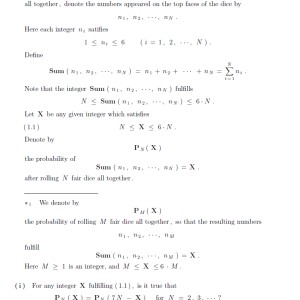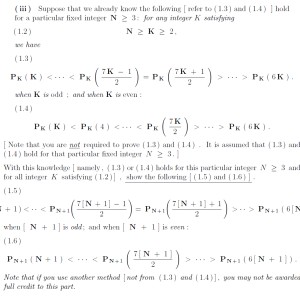Probability
Answer
Answers can only be viewed under the following conditions:
- The questioner was satisfied with and accepted the answer, or
- The answer was evaluated as being 100% correct by the judge.
4.8K
-
Leave a comment if you need any clarifications.
-
if u add 1 to both n and k, shouldn't u add 1 to 2?
-
You are not adding 1. You are taking N' and K' to be your new N and K. You just want to make sure that $N'$ and $K'$ to be bigger than 2 so you can use the stated results.
-
and what's the reason behind making n' = k' it was N>= K >= 2
-
If you just replace $N$ by $N+1$ and $K$ by $N+1$ in (1.3) and (1.4) we get (1.5) and (1.6). I will edit the answer in a minute.
-
Done.
-
can u explain the reason why u made N' = K' >=2. It was initially N>= K >= 2
-
N and K are just two general variables, and they can be replaced by any other variables.
-
Also note that you still have N'>=K'>=2. We just know that N'=K' which also implies N'>=K'>=2.
The answer is accepted.
Join Matchmaticians Affiliate Marketing
Program to earn up to a 50% commission on every question that your affiliated users ask or answer.
- answered
- 1369 views
- $4.00
Related Questions
- Calculating the Probability of a Varied Selection in Pet Shop Purchases
- Probability that the distance between two points on the sides of a square is larger than the length of the sides
- foundations in probability
- Find the odds of event b
- A bag contains 3 red jewels and 7 black jewels. You randomly draw the jewels out one by one without replacement. What is the probability that the last red jewel was the 8th one withdrawn?
- Product of Numbers from a Log Normal Distribution
- Probability
- Expected value of random variables - On average, how many points do you expect to receive in each round of this game?


